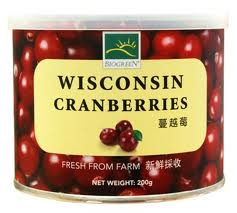Could mining Wisconsin sand lead to butter and cranberry shortages?
By Joel Greeno, Op Ed for OtherWords.org, November 14, 2012
My family has raised dairy cows on our farm in Monroe County near Kendall, Wisconsin, for almost 150 years. We’ve weathered the Great Depression, low milk prices, droughts, floods, and snowstorms. Despite difficulties, the dairy and related industries generate $26.5 billion in revenue, 174,000 jobs, and fresh, healthy milk, cheese and butter for the state each year.
Other local families have harvested cranberries for generations. Wild cranberries are native to central Wisconsin’s marshlands, and cranberries have become the state’s largest fruit crop. They contribute $350 million and 7,200 jobs to our state’s economy, while comprising almost 60 percent of the nation’s total harvest.
My farm is just a few miles from the town of Warrens, the center of Wisconsin’s cranberry country and home of the world’s largest cranberry festival, with more than 140,000 visitors this year. Thanksgiving wouldn’t be the same here or anywhere else if our cranberry crop vanished.
Mining Wisconsin’s high-quality sand is another industry that’s been established for some time. However, the recent spike nationwide in hydraulic fracturing, or fracking, for natural gas and oil has boosted demand for the sand the process requires. If all 86 planned facilities for the state are built and mined, they would account for about 2,800 jobs. Those jobs would be helpful but hardly remarkable or sustainable. The sand will eventually be depleted. Then what?
Mining companies are offering farmers in Monroe and neighboring counties millions of dollars for their land, and a number of them have sold. I can’t really blame them — that’s more money than most dreamed of making over a lifetime. But the consequences are horrific.
Extracting sand on a wide scale would convert thousands of acres of our countryside into open pit mines. Each oil or gas fracking well can use as much as 3 million pounds of sand — 1,500 tons — before it’s tapped out. And there are thousands of these wells nationwide.
In addition to the loss of productive farmland, fracking uses huge amounts of water. Cranberry bogs are meticulously designed to take advantage of the water stored in the marshes, which is necessary for harvesting, and growers generally set aside seven acres of land for every acre planted to store this water. Marshes surrounded by sand pits will eventually lose water as it seeps into the pits, leaving berry growers high and dry.
Sand mining also poses a serious risk of groundwater contamination, further threatening the lives and livelihoods within rural communities. In addition, heavy truck traffic leads to congestion, overburdens the roads and amplifies road noise, damaging the overall quality of rural life.
Once farms are destroyed, it’s pretty hard to rebuild them, just as it’s hard to bring farmers back to the land once they leave. Farmers in this region shouldn’t have to choose between diametrically opposed options — continue farming at a loss by incurring more and more debt or selling their farms to be converted into sand pits to relieve debt.
Many of these farmers wouldn’t consider selling their land if they saw a real future in farming, and the future depends on a fair price for their products, whether it’s cranberries, turkeys, or milk. The people who provide our food and beverages for every meal deserve a living wage. The small number of short-term mining jobs that large-scale sand mining might create just doesn’t justify destroying our food supply, farmers’ livelihoods, and rural communities.
Extracting sand, oil, gas, or any other finite resource means that eventually the mined land will be worth nothing. The mining companies will move on, taking the jobs and leaving behind scarred landscapes and empty houses.
On the other hand, if farmers receive a fair price from the buyers of their product, especially renewable, sustainable ones such as cranberries, butter or milk, everyone wins — local businesses thrive, schools and other infrastructure are supported, and future generations of farmers have real opportunities.
If farmers get paid fairly, they’ll keep producing good products. Everyone will be able to enjoy a good meal. And farmland and rural communities won’t be turned into sand pits. We would all be grateful for that.
Joel Greeno is a dairy farmer in Kendall, Wisconsin, president of the American Raw Milk Producers Association, and at-large board representative for the National Family Farm Coalition. See this web site: NFFC.net

